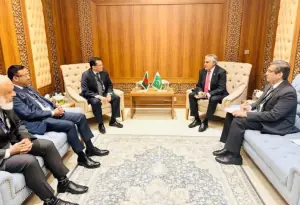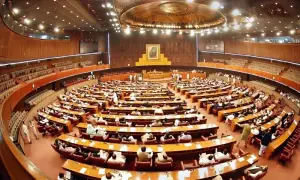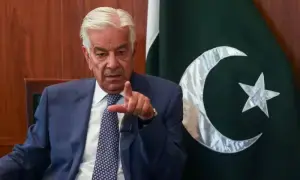Purpose of political trials is to legitimise power grabs, says Justice Shah
3 min readJustice Mansoor Ali Shah released his additional note regarding the Zulfiqar Ali Bhutto reference on Tuesday, saying that authoritarian regimes utilise political trials against political opponents to legitimise their hold on power and stabilise their rule.
The outcome of such trials often hinges on the defendant’s behaviour in relation to the authoritarian government, he said.
In March, the Supreme Court admitted that Bhutto was not given the right to a fair trial, almost 44 years after the Pakistan Peoples Party’s founding chairman was hanged in a murder case. The short order said that the proceedings of the trial by the Lahore High Court and of the appeal by the Supreme Court did not meet the requirements of the fundamental right to a fair trial and due process.
The CJP pronounced the top court’s opinion on the long-pending presidential reference to answer whether it could revisit the 1979 judgement that sent Bhutto to the gallows.
Former dictator General Ziaul Haq’s personal survival depended on Bhutto being found guilty, the Supreme Court said in its detailed order.
Justice Shah noted that such trials were employed to “defame and punish” political opponents, relying heavily on statements obtained from former associates of the accused. He pointed out that such associates are coerced into providing evidence against the defendant.
He explained that political trials serve as a “powerful judicial weapon for authoritarian governments,” often violating the principles of justice to achieve desired outcomes.
The Supreme Court judge stated that the Bhutto’s murder case “is a prime example of a political trial,” noting that numerous violations of procedure and justice occurred to achieve the desired outcomes. He emphasised that judges during authoritarian regimes must remember that their true power lies not in holding office, but in maintaining their independence and standing firm on principles.
He praised former jurist Justice Dorab Patel for his courageous dissent in the Bhutto case, which led to the acquittal of the charges against Bhutto. Justice Patel refused to take an oath under General Zia’s Provisional Constitutional Order.
He remarked that losing a position was a “small sacrifice” compared to leaving behind a legacy of compromise. The courage of a judge is measured by their ability to withstand pressure and uphold judicial independence, the judge said and added that delaying resistance against authoritarian interventions can be “fatal” to the rule of law and such interventions should be met with “immediate” resistance and rectification.
The role of the judiciary, he asserted, is to “defend justice, not to undermine it.”
The additional note also referenced Bhutto’s own writings, reinforcing the significance of this historical case in discussions about judicial integrity and political influence.
In his note, Zulfiqar Ali Bhutto stated that an independent judiciary “opposes martial law and can only operate under the protection of the Constitution, not under the shadow of guns.” He added that an independent judiciary works alongside the executive and the legislature.
“The executive is in jail, and the assemblies are as silent as a graveyard. Can a flower thrive in a garden that has turned into a desert?”
For the latest news, follow us on Twitter @Aaj_Urdu. We are also on Facebook, Instagram and YouTube.






















Comments are closed on this story.